Berklee Composition Student Writes Corporate Soundscape for Natixis
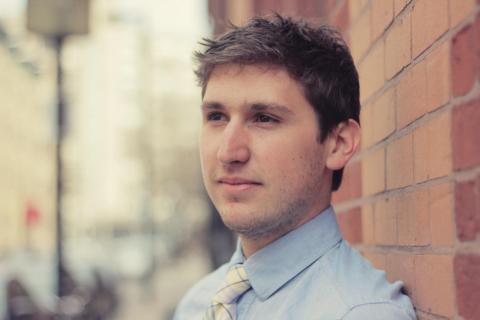
Andres Villareal '14
Photo courtesy of Andres Villareal
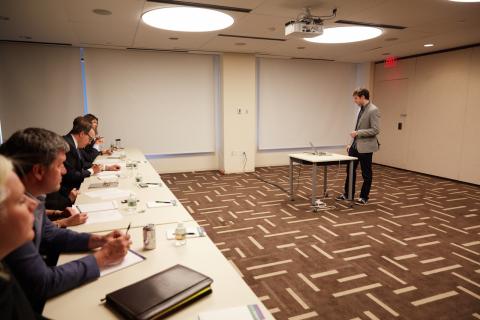
Andres Villareal presents his composition to Natixis judges.
Photo by Kelly Davidson
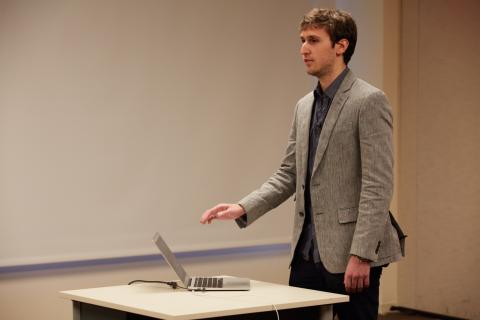
Andres Villareal presents his composition to Natixis judges.
Photo by Kelly Davidson

Ella Joy Meir '14, Miguel Coca '14, and Andres Villareal '14 discuss their compositions.
Photo by Kelly Davidson
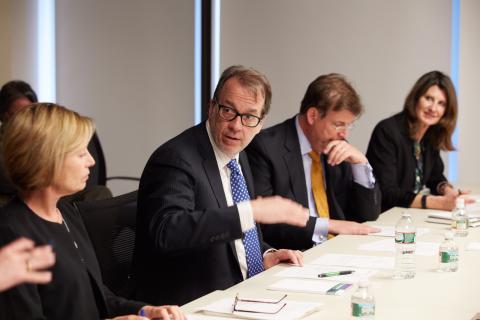
Natixis judges discuss the compositions.
Photo by Kelly Davidson
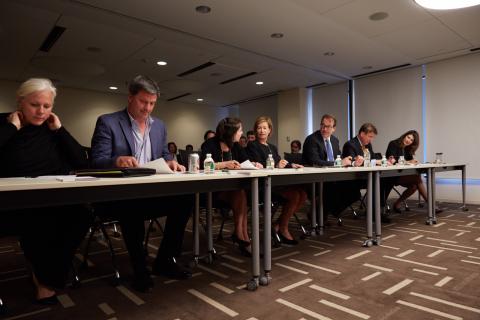
Natixis's panel of judges
Photo by Kelly Davidson
A company’s jingle can be just as important in influencing how a potential customer feels about its brand as any words spoken about it. But how can dozens of positive thoughts be packed into a sonic signature as short as a few seconds?
This is what Andres Villareal '14, a contemporary writing and production student at Berklee, tried to figure out when he sat in front of his piano this spring. He wanted to find just the notes that would inspire trust in Natixis Global Asset Management—and win Natixis’s confidence in him.
Villareal was one of three Berklee students vying for the job of composing the music Natixis will use in various commercial applications, from radio and TV spots to what customers hear when they are on hold. Competing against him were fellow CWP majors Miguel Coca '14 and Ella Joy Meir '14. CWP faculty picked these three students’ projects among nine or so that were submitted.
“I was just really, really proud and feeling grateful that I was in the (same) league as these two other people, because I had heard a lot of their work. Ella had tutored me in ear training. I looked up to them,” Villareal, who placed first, said.
CWP chair Matthew Nicholl said that all three students submitted exceptional pieces, “well above what I would call typical student work, reaching a level that is competitive with the best of the professionals currently in the industry.”
This shows, Nicholl said, that “Berklee is attracting and accepting students that are really talented … (and) the concentrate, supported by the music core, is effective.”
The three musicians played their pieces before Natixis judges at the company’s Boylston Street offices in May. Natixis, a corporation that manages nearly $900 billion worldwide, wanted a tune that conveyed innovation, durability, stability, modernity, and more.
Click here to read a press release about the competition.
In composing his piece, Villareal used percussion to create a global feel, reverse sound design to impart a sense of innovation, and “strings everywhere” to convey elegance.
“It’s a huge company and sounded kind of majestic, so what sounds majestic to me is strings,” he said. But most of all he was going for the sound of trust, an emotion he hoped to inspire through a combination of instruments, harmony, and melody.
The Natixis team praised his piece as modern, upbeat, diverse, global, and energetic. They also liked how Villareal used the piano to represent the individual investor, breaking it off from a group of instruments and allowing it to play a prominent role in the composition.
Upon hearing of his win, a couple of weeks after the competition, Villareal said he was a little surprised. “I heard the other project and I thought all of them were incredible. So it was just a matter of taste at that point,” he said.
He also immediately called his parents back home in Monterrey, Mexico, to tell them “hey, I’m not going to go broke.”
The Natixis work is his first paid gig. In addition to getting his music played around the world, Villareal won $2,500. Natixis has also talked to him about more work, which he’ll do from Los Angeles, where he now has a full-time job with well-known Latin pop producer (and fellow Berklee alumnus) Aurio Baqueiro.
But even for the two contestants who didn’t get the job, Nicholl said, the competition gave them experience in several situations, including interviews with the media and presentations to the clients, in which they had to articulate their creative and technical processes. Coca, who placed second, received $1,000, and Meir won $500.
